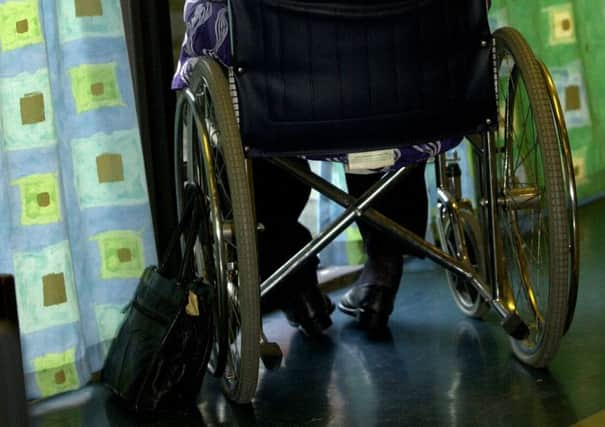Ian Welsh: Creating better world for disabled and carers


How do we construct a healthier, fairer Scotland? How do we foster the power of communities to make our health and wellbeing better? These are the type of questions the Scottish Government is currently asking of people across the country through a series of national conversations on issues like health and social care, social justice, employability. With less than a year to go before the next Scottish Parliament election, we at the Health and Social Care Alliance Scotland (the Alliance) see these discussions as an opportunity for people who live with long-term conditions, disabled people and unpaid carers to influence what happens next.
Our manifesto for the next five years, formulated with our 1,200 members, aims to strike a balance between the need to prevent issues before they arise, creating a socially just Scotland and ensuring the voice of lived experience is well heard.
Advertisement
Hide AdAdvertisement
Hide AdOne concerning theme to which our members keep returning is the waning level of social connectedness and its impact on Scotland’s health. Earlier this year the Scottish Parliament’s health and sport committee received evidence from a range of organisations, reinforced by numerous academic studies, that social isolation contributed to the development of depression and a range of other conditions.
Our members, including the Food Train, the British Red Cross and more, are working closely in communities on ever more innovative and effective models of addressing and preventing social isolation. Indeed, our own Links Worker programme, a pilot partnership project working in Deep-End GP practices in seven of the most deprived areas of Scotland, is built on a model that aims to tackle social isolation through finding community-based solutions to a range of different challenges.
Raising social isolation up the political agenda would, in our view, be a start. However, a key change must be to add reference to social connectedness to the Scottish Government’s National Performance Framework and use this as the basis for underpinning the type of support and services available.
The Scottish Government’s public service reform agenda relies heavily on fostering and delivering the types of partnerships that make a difference to these issues, but further capacity building support for third-sector organisations (including Scotland’s 32 Third Sector Interfaces) is required if we are to maximise the sector’s ability to keep on finding new solutions.
This doesn’t just mean funding but also a shift to being much more serious about delivering preventative services and greater engagement of third-sector organisations in strategic decision-making processes, some of the principles key to the success of the Alliance’s Self Management Impact Fund since it was established in 2009.
The fund, a partnership between the Alliance and the Scottish Government, has sought to invest in the capacity of communities and the sector to encourage innovative self-management techniques and support. With additional support this can go further, encouraging improved access to high quality information about local sources of support and targeted investment towards digital participation and the benefits eHealth opportunities offer.
We must also look at how representative public figures and decision makers are of the wider community they serve. As the One in Five campaign has highlighted, political participation among disabled people in Scotland must increase. But, in our view, this goes right to the heart of government. We believe that creating an advocate for the rights of people who live with long-term conditions, disabled people and unpaid carers, with a ministerial post attached, would put the issue right into the heart of the Scottish Cabinet. At one stroke, the Scottish Government would put the interests of sometimes disempowered groups firmly on to the policy agenda and stimulate engagement and better representation
We shouldn’t forget either that this is a fertile ground for policy and practice development. As the new Smith powers come to the Scottish Parliament, including control of social security related to disability and employability programmes used by many thousands of disabled people, we must again look at how our systems are set up.
Advertisement
Hide AdAdvertisement
Hide AdThe introduction, for example, of face-to-face assessments for Employment and Support Allowance and Personal Independence Payments has been painful for many people. It is undeniable that the longer-term aim must be to humanise this process, creating the opportunity for better understanding of what people should be able to expect of assessors, the type of support they can access to help them through the process (including the Alliance’s Social Security Advocacy Pilot Project supported by the Scottish Government) and how decisions can be challenged in a meaningful, clear way.
Looking forward to May 2016 gives us an opportunity to look at the policy landscape with renewed hope and vigour for the future. The next challenge is creating a society fit for disabled people, people who live with long-term conditions and unpaid carers to enjoy their right to live well.
• Ian Welsh is chief executive of the Health and Social Care Alliance Scotland.